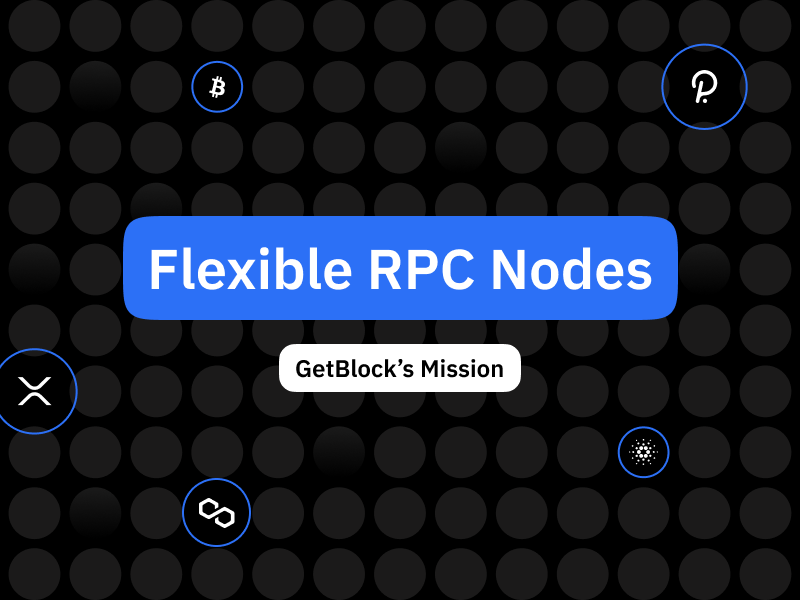In 2023, the “one size fits all” approach to Web3 infrastructure is no more. Here’s how blockchain nodes providers try to make their propositions flexible in a Lego-like manner
Blockchain nodes providers gained traction in 2020-2021 as they streamlined the development of decentralized applications. Crypto developers started using private RPC nodes maintained by providers instead of running their own blockchain infrastructure.
Nowadays, with the acceleration of competition in Web3, customizability has become the hottest trend in the infrastructure segment.
Promises and challenges of custom solutions in crypto
Initially, the vast majority of decentralized applications (dApps) looked similar to each other. They leveraged the same blockchains (typically, Ethereum, Tron or BNB Chain), handled the same (actually, not so big) traffic and were focused on standardized scope of use-cases.
That’s why all of these dApps needed more or less similar solutions: fast, affordable and easy-to-maintain. As such, blockchain RPC providers used to roll out the toolkit of ready-made node endpoints for all users.
In recent years, the situation has changed. With the maturation of the segment as a whole, developers started offering more and more sophisticated and eccentric solutions in DeFi, NFT, trading spheres. Many of them prioritized the opportunity to access various heterogeneous blockchains without leaving a single interface: cross-chain DEXes, or, at least, applications supporting various EVM ecosystem networks.
That’s why the crypto scene started switching towards customizable infrastructure solutions. Today, it’s crucial to closely follow the clients’ needs and to be able to adjust the services accordingly. Also, Web3 infrastructure builders should be ready to deliver novel solutions by requests.
Making blockchain nodes infrastructure flexible: Case of GetBlock
GetBlock was amongst the RPC node providers that pioneered the new approach. It launched in Q4, 2019 as one of the first mainstream vendors of RPC nodes to decentralized applications.
GetBlock offers its customers shared and dedicated nodes; i.e. it allows clients to either share computational resources with peers or use isolated servers. Nowadays, it connects hundreds of dApps to 50+ blockchains through WebSockets, REST API and JSON RPC interfaces. Both tetsnets and mainnets are available to GetBlock’s customers.
Also, GetBlock offers individual solutions for enterprises beyond standard packages. This offering is designed for dApps with special needs including 99.99% uptime guaranteed by SLA, personalized support via preferred messenger (e.g. Slack), custom-made dashboards and alerts.
For enterprise clients, GetBlock can deploy any protocol by request and develop load balancing infrastructure for increased load balancing demands.
GetBlock offers a number of rare blockchains that are unavailable for the customers of key competitors. Besides programmable blockchains, the service works with the networks that don’t support smart contracts by default – Dogecoin, Litecoin etc. This feature is of paramount importance for the products focused on cross-chain and multi-chain interactions.
Holistic approach to Web3 infrastructure
High-performance solutions are available for both shared and dedicated nodes users. GetBlock has free packages with an impressive number of requests per second (RPS) metric: clients can claim 40,000 requests daily paying zero fees. With its “pay-per-use” model, GetBlock’s pricing becomes resource-efficient for clients with various budgets.
Its dedicated nodes are fully customizable: every user can set up his own endpoint to the dedicated node via its account in a Lego-like manner. He or she just needs to choose the name of the network, the type of interface and choose whether he or she needs mainnet or testnet.
GetBlock cares about clients focused on privacy. It added MetaMask authorization so that the customers can even avoid sharing email with the service. It also doesn’t harvest any sensitive personal data. Both fiat and crypto payments are accepted on paid packages.
Last but not least, GetBlock offers an industry-leading customer support service 24/7, according to reviews of Its long-term customers found on sources such as SourceForge. CS officers are always ready to create innovative solutions together with customers. High-quality customer support is another pillar of flexibility of GetBlock’s services.
Starting from Q2, 2023, GetBlock is running a multi-level affiliate program. Every social media user, blogger or crypto enthusiast can earn rewards for sharing a link to GetBlock, even if he or she doesn’t use blockchain nodes himself/herself. The program is poised to bring new users to the segment of customizable RPC nodes.
